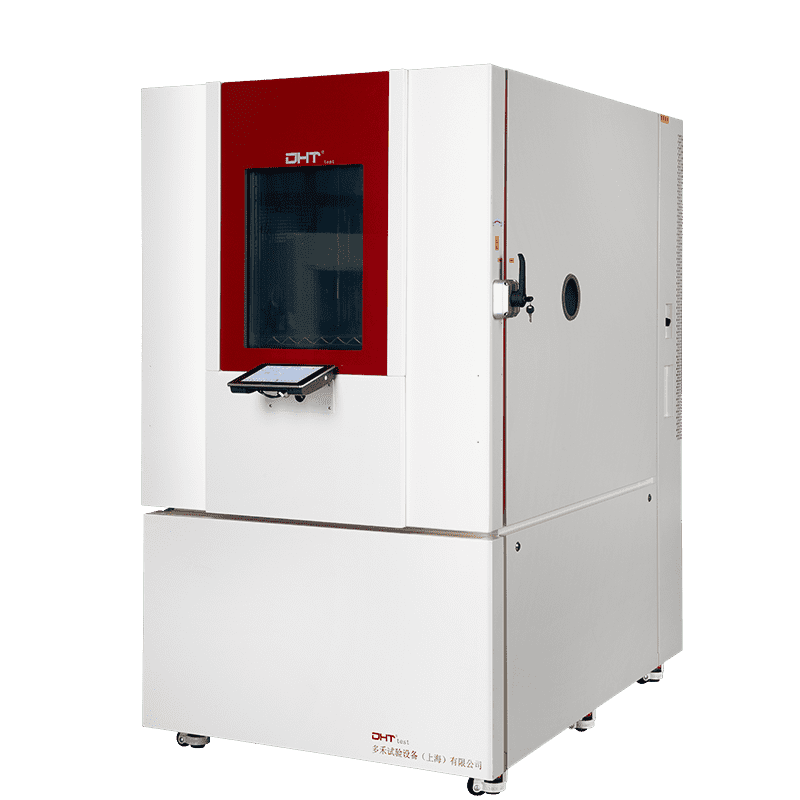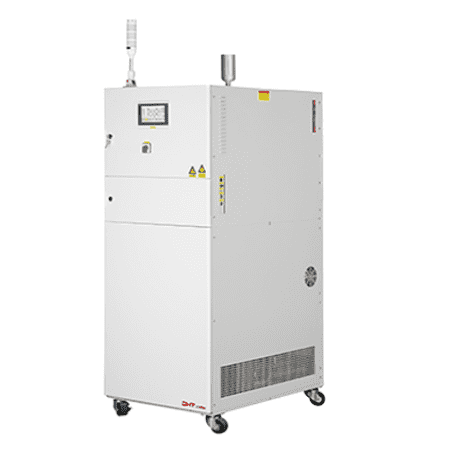Written by Robin
Senior Engineer, Doaho Test (DHT®)
An industrial chiller is one of the core pieces of equipment that provides stable chilled water or coolant circulation, offering reliable cooling for industrial machinery, laboratory instruments, and production processes. For companies engaged in test chamber development and industrial manufacturing, choosing the right chiller manufacturers and high-performance industrial water chillers not only enhances production efficiency but also ensures the accuracy and consistency of experimental data. So, what exactly is an industrial chiller, and what practical advantages does it bring to production and scientific research?
What Is an Industrial Chiller?
An industrial chiller is a specialized cooling system designed to supply low-temperature water or coolant. Its core principle involves refrigeration through compression, condensation, evaporation, and circulation, lowering the liquid to a set temperature and maintaining continuous circulation. This ensures stable cooling for industrial production, laboratory experiments, and precision equipment. Unlike household air conditioners or conventional cooling devices, industrial chillers feature:
- High Cooling Capacity: Industrial chillers can deliver cooling power ranging from several kilowatts to several hundred kilowatts, meeting the demands of medium- to large-scale production lines and experimental equipment.
- High Temperature Control Accuracy: Temperature control precision typically ranges from ±0.5°C to ±1°C, ensuring stable conditions for test chambers and other precision devices.
- Stable Circulation: Through pumps and piping systems, industrial chillers provide long-term, continuous circulation, guaranteeing reliable operation over extended periods.
- Wide Range of Applications: They can cool injection molding machines, welding equipment, laser cutters, and other industrial machinery, as well as support temperature-controlled experiments in pharmaceuticals, food processing, electronics, and test chambers.
Modern industrial chillers are equipped with intelligent control systems, energy-efficient compressors, and eco-friendly refrigerants, delivering both high-performance cooling and sustainability—making them indispensable in industrial production and laboratory research.
Advantages of Industrial Chillers in Production
- Improve Equipment Efficiency and Production Accuracy For injection molding machines, welding machines, laser cutting systems, and various test chambers, temperature stability directly impacts production efficiency and product quality. Industrial water chillers quickly remove excess heat from equipment or samples, maintaining optimal process temperatures to:
- Prevent downtime due to overheating
- Enhance production efficiency and product consistency
- Ensure reliable and reproducible test data from precision equipment
In semiconductor, battery, and electronic component manufacturing, temperature deviations can reduce performance or yield. A reliable industrial chiller is therefore essential for precise production and testing.
- Extend Equipment Lifespan High temperatures and prolonged operation are major causes of industrial equipment failure. By precisely cooling critical components and molds, industrial chillers can:
- Reduce equipment breakdowns and maintenance frequency
- Prolong equipment service life
- Lower long-term operational costs
In high-load or continuous production environments, stable industrial water chillers are key to ensuring uninterrupted operation.
- Energy Efficiency and Cost Reduction Modern industrial chillers utilize energy-efficient compressors, optimized condensers, and circulation pumps, often combined with intelligent controls that automatically adjust cooling power based on load. This enables:
- Dynamic energy savings and reduced electricity consumption
- Lower operating costs and improved economic efficiency
- Use of eco-friendly refrigerants that comply with international environmental standards
For large production lines or long-running test chambers, the energy savings are substantial, aligning with corporate green initiatives.
- Flexible Adaptation Across Industries Industrial chillers are versatile and can be customized to meet specific industry and process requirements, including:
- Adjustable temperature ranges to suit different experiments or processes
- Rapid temperature response for thermal cycling tests
- Multi-circuit systems to provide cooling for multiple machines simultaneously
Whether for injection molds, food processing, or stability testing of high- and low-temperature test chambers, selecting the right chiller manufacturers and customized industrial water chillers ensures tailored solutions for diverse applications.
- Enhance Experimental and Production Environment Stability Temperature fluctuations directly affect the reliability of experimental data and product consistency. By providing stable cooling cycles, industrial chillers not only lower equipment temperature but also optimize the overall work environment to:
- Ensure repeatable experimental conditions
- Improve batch-to-batch product consistency
- Increase operator comfort and safety
This advantage is particularly critical for pharmaceutical laboratories, food testing facilities, and high-precision electronics manufacturing.
How to Choose the Right Industrial Chiller Manufacturer
When selecting chiller manufacturers, consider the following:
- Cooling Requirements: Define the required temperature range, cooling capacity, control accuracy, and circulation type.
- Industry Application: Different industries have distinct needs—automotive electronics may prioritize rapid thermal cycling, while pharmaceutical labs focus on temperature and humidity precision.
- Reliability and Precision: Evaluate the manufacturer’s core technologies, quality systems, and long-term operational stability.
- After-Sales Support: Timely installation, commissioning, maintenance, and servicing are crucial to uninterrupted production.
- Budget and Lifecycle Costs: Consider not only initial equipment costs but also energy consumption, maintenance, and replacement costs to ensure a favorable return on investment.
Conclusion
For companies involved in test chambers, electronic components, mold production, or new energy research, the importance of industrial chillers cannot be overstated. Whether ensuring precise test results or optimizing production processes, stable and high-performance industrial chillers are indispensable temperature control tools in modern industry. As a professional temperature control equipment manufacturer, DHT® provides high-performance, durable industrial water chillers that can be customized to meet various production and laboratory requirements. These solutions help businesses achieve precise temperature control, energy-efficient operation, and long-term stability.
If you aim to enhance equipment efficiency, ensure experimental accuracy, or optimize your production environment, contacting DHT® will provide you with professional solutions and technical support, ensuring your production and research remain at the forefront of the industry.


